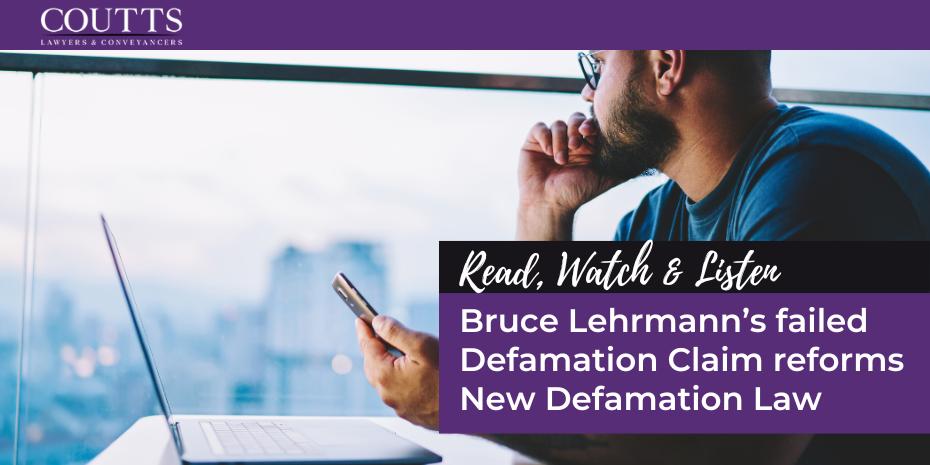KEY TAKE-OUTS
- Amber Heard published an opinion piece on domestic violence in the Washington Post in December 2018 which alluded to incidents that occurred during her relationship with Johnny Depp (although he was not named).
- Johnny Depp commenced a legal suit against Amber Heard in defamation stating that the opinion piece was not true and alleging that Amber Heard was not a victim of domestic abuse but rather a perpetrator. Amber Heard countersued Johnny Depp after Johnny Depp’s lawyer described her allegations of physical and emotional abuse as a “hoax” to journalists.
- The defamation trial began on 11 April 2022 in Fairfax County, Virginia, United States and concluded after a six week trial, in which a jury unanimously found in favour of Johnny Depp on all elements of his claim that Amber Heard defamed him. Amber Heard also succeeded on one part of her counterclaim. Both were awarded damages.
- Whilst the laws in the United States vary greatly from those in Australia, the Depp v Heard case is a great example of what threshold needs to be met to succeed in an action in defamation.
What sparked the Johnny Depp v Amber Heard trial?
Former Hollywood couple, Johnny Depp “Depp” and Amber Heard “Heard” have been making headlines recently following their very public defamation trial. Depp has alleged that Heard falsely portrayed him as a domestic abuser in an opinion piece published in the Washington Post, describing herself as “a public figure representing domestic abuse”. Although the opinion piece did not reference Depp by name, it is believed to reference a restraining order Heard sought in May 2016 after Depp told her he wanted a divorce.
The $50 million lawsuit was filed by Depp in March 2019, three months after Heard’s opinion piece was published. The lawsuit alleged that Heard was not a victim of domestic abuse but rather a perpetrator. Depp claimed that Heard had committed multiple acts of domestic violence towards him during the marriage.
Heard responded to Depp’s lawsuit by accusing him of being a serial abuser, having physically assaulted her throughout their relationship, often under the influence of alcohol or drugs. In August 2022, Heard filed a counterclaim in the sum of $100 million against Depp, accusing him and his lawyers of defamation in turn. Heard alleged that Depp lied about her during interviews and that he was behind an online harassment campaign.
Opposing arguments in the Johnny Depp v Amber Heard trial
The Johnny Depp v Amber Heard trial began on 11 April 2022, being held in Virginia, United States which historically has a weak anti-SLAPP (Strategic Lawsuits Against Public Participation) law. SLAPP suits are lawsuits in the United States which are often used as a tool for intimidating and silencing criticism through expensive, baseless legal proceedings. Virginia’s relaxed anti-SLAPP laws made it easier for Depp to commence defamation proceedings against Heard. Whilst SLAPP suits do not exist in Australia, it is important to note that Defamation claims carry a high threshold of proof.
Depp’s legal team accused Heard of making up abuse allegations to further her own career. Alternatively, Heard’s lawyers claimed that Depp had physically and sexually abused her on multiple occasions.
Over a period of six weeks, the jury heard from numerous witnesses and experts, many of which testified about explosive fights between the couple. Whilst on the stand, Depp also claimed that Heard would instigate arguments between the couple. At the end of his four day testimony, Depp was asked what he had lost due to Heard’s opinion piece, to which he replied “nothing less than everything.”
During Heard’s testimony, she painted a picture of a man who oscillated between active addiction and sobriety and claimed this made it difficult to continue the relationship. Heard alleged that Depp hit and abused her many times and outlined in graphic detail the examples of abuse. During her last appearance in the witness box, she was asked what it had been like to face the accusations that her claim of abuse was a hoax. Heard testified that “[she was] harassed, threatened, humiliated … every single day.”
What did the jury have to consider in the Johnny Depp v Amber Heard trial?
Despite the various allegations raised by Depp and Heard during the trial, the jury faced the complicated task of determining if several statements published in the media were defamatory to either Depp or Heard. In order to determine this the jurors had a series of questions to answer, including whether statements made by either side were false and made with “actual malice” with reckless disregard for the truth.
In their concluding statements, Depp’s legal team told jurors that Heard had “ruined his life by falsely telling the world she was a survivor of domestic abuse at the hands of Mr Depp”. Alternatively, Heard’s legal team requested the jurors “think about the message that Mr Depp and his attorneys are sending to Amber and victims of domestic abuse”.
What was the verdict in the Johnny Depp v Amber Heard trial?
Following a six week trial, the jury unanimously found in favour of Depp on all elements of his claim which was that several lines in Heard’s opinion piece were defamatory and had impacted his livelihood. He was awarded $US10 million in compensatory damages and $US5 million in punitive damages. Only one aspect of Heard’s counterclaim that she was defamed by Depp’s lawyer was ruled defamatory. She was awarded $US2 million in compensatory damages. Although public interest of the trial revolved around the sensational and personal claims made by each side about Depp and Heard’s relationship and personalities, the jury’s only focus in coming to its decision was on the narrow legal points of defamation law to ensure that the legal thresholds required to prove defamation were met.
How to succeed in a defamation claim
Whilst the laws in the United States vary greatly from those in Australia, the Johnny Depp v Amber Heard case is a great example of what threshold needs to be met to succeed in an action in defamation. In summary, a party that wishes to bring a defamation claim in New South Wales needs to:
- Prove that the material was published by the other party and contained one or more defamatory claims about a person or their behaviour which identified them, is false and portrays them in a negative light.
- Prove that the material published has caused harm to their reputation.
However, to succeed in a defamation claim, a party needs to overcome the common defences raised including that the other party can prove that the claims published are substantially true, the other party was offering their honest opinion rather than making a statement of fact or the other party was innocently distributing defamatory material without knowledge or intent.
If you believe that you have a claim in defamation, you should seek legal advice as soon as possible as there are strict time limits to make a claim in defamation. At Coutts, our commercial litigation team has ample experience in advising clients on their potential defamation claims and defending defamation claims.
If any of the topics covered in this blog have been upsetting, we urge you to contact Lifeline on 13 11 14 or 1800 Respect National Helpline on 1800 737 732.
ABOUT MELISSA CARE:
Melissa is a Senior Associate at Coutts Lawyers & Conveyancers working from our Campbelltown Office and has extensive experience in the areas of Civil Disputes & Litigation, Building and Construction Disputes, Commercial Litigation & Employment Law for both corporate clients and individuals.
Melissa holds a Bachelor of Laws, Bachelor of Commerce (Majoring in Marketing), Graduate Law Diploma from the College of Law; and has been admitted to the Supreme Court of NSW and the High Court of Australia.
For further information please don’t hesitate to contact:
Melissa Care
Senior Associate
info@couttslegal.com.au
1300 268 887
This blog is merely general and non-specific information on the subject matter and is not and should not be considered or relied on as legal advice. Coutts is not responsible for any cost, expense, loss or liability whatsoever to this blog, including all or any reliance on this blog or use or application of this blog by you.




